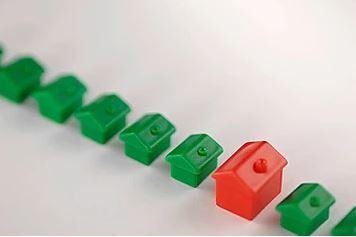Buying Secret #10: Keep Your Money Where It Is
It’s not wise to make any large purchases or move money around for at least four to six months before buying a new home. Don’t want to take any chances with altering a good credit profile. Lenders need to see that you are reliable and creditworthy. They want to see a complete paper trail so that they can get you the best loan available. If you open new credit cards, take on too much debt or make a lot of big-ticket purchases, there's a chance you are going to have a hard time getting a loan approval.
Buying Secret #9: Get Pre-Approved, Not Just Pre-Qualified for Your Home Loan
There’s a big difference between a buyer being pre-qualified and a buyer who has a pre-approved mortgage. Anybody can get pre-qualified for a loan. Getting pre-approved means a lender has looked at all of your financial information and they’ve let you know how much you can afford and how much they will lend you. Being pre-approved will save you a lot of time and energy so you are not running around looking at houses you can't afford. It also makes you a very strong buyer from the sellers perspective. In some cases, as strong as cash buyers.
Buying Secret # 8: Don’t Try to Time the Market
Don’t obsess with trying to time the market and figure out when the best time to buy is. Trying to anticipate the housing market is near impossible. The best time to buy is when you find your perfect house and you can afford it. Real estate is cyclical in that it goes up and it goes down and back up again. So if you try to wait for the perfect time, you’re probably going to miss out.
Buying Secret # 7: Bigger Is Not Always Better
Most people are drawn to the biggest, most beautiful house on the block. But bigger is usually not better when it comes to houses. When it comes to real estate don’t buy the biggest, best house on the block. Your home is only going to go up in value as much as the other houses around you. If you pay $600,000 for a home and your neighbors pay $450,000 to $350,000, your appreciation is going to be limited. Sometimes it is best to buy the smaller house on the block, because the smaller (or some cases distressed) house per square foot always trades for more than the biggest house. This will allow you to build into the neighborhood.
Buying Secret #6: Avoid Unrealized Costs
One difference between renting and homeownership is the unrealized costs. Most buyer simply compare their mortgage payment with their rent payment. However buyers need to also be aware of the other expenses such as property taxes, utilities, repairs and maintenance. Make sure you take the time to ask the seller what they budget for so you’ll be covered.
Buying Secret #5: Avoid a Border Dispute
It’s important to do a survey on your property so you know exactly what you’re buying. Knowing precisely where your property lines are may save you from a potential dispute with your neighbors. You will need one if putting in a fence or adding onto the home. Your property taxes are based on how much property you have, so it is best to have an accurate map drawn up.
Buying Secret #4: You’re Only Buying a House
Buying a house based on emotions will break your heart and your bank account. If you fall in love with a home before you get into contract you might end up making some pretty bad financial decisions. When you fall in love with a home before you get into contract and end up not getting into contract, there’s a chance no other house will meet your expectations. There’s a big difference between your emotions and your instincts. Going with your instincts means that you recognize that you’re getting a great house for a great value. Going with your emotions often means over paying just so you get the house.
Buying Secret #3: Give Your House a Physical
Hire a home inspector. It’ll cost about $500-$600 for a standard home inspection but could end up saving you thousands. A home inspector’s sole responsibility is to provide you with the current condition of the home so that you can make a decision as to whether or not to buy it. It’s really the only way to get an unbiased third-party opinion on the homes condition. Its better to spend the money up front on an inspector than to find out later you have to spend.
Buying Secret #2: The Science of Your Opening Bid
When making an offer on a property or setting a listing price, a simple Market Analysis or standard “CMA” just isn’t enough. Yes, it will give you a baseline, but this is where having a Realtor with a deep understanding of the real estate market means the difference between you over paying or you selling for too little.
Things to consider when assessing your offer(s). First and foremost you identify a price range by considering,
- Recently Sold Homes
- Home Amenities & Finishings
- Location
- Current Condition
- Lot Size
- If Renovating, the Finished Renovated Value
Now, establish a maximum bid amount. Your opening bid should be based on two things:
What you can afford (because you don’t want to outbid yourself), and what you really believe the property is worth.
Make your opening bid something that’s fair and reasonable and isn’t going to totally offend the seller. You want to be taken seriously from the start and stand out amongst other buyers. A lot of people think they should go lower the first time they make a bid. Depending on what the market is doing at the time, demand and the condition of the home/property and days on the market should be considered.
Being pre-approved vs. pre-qualified with a strong downpayment increases your buyer standing. If you’re in a multiple bid situation you may consider limiting or waiving inspection contingencies.
Buying Secret #1: Stalk the Neighborhood
Before you buy, get to know the neighborhood. Drop by or drive through in the morning, at noon and night. Some homebuyers get buyer remorse because they thought they found the perfect home, only to find out the neighborhood wasn’t for them. Drive by the house at all hours of the day to see what’s happening in the neighborhood. Take the time do drive or walk your regular commute from the house to make sure it is something you can deal with on a daily basis. Find out how far it is to the nearest grocery store, school(s),etc. Even if you don’t have kids or your children are grown, research the schools system. If you buy a house in a good school district vs. a bad school district, the value can be affected as much as 15% percent.
For more information on the above tips or begin your home search, contact Christian Di Stasio today at (646) 280-7136 or email at [email protected].
#christiandistasio #distasiorealestategroup #theboutique #venturerealtors #realtor #realestate #bergencountynj #morriscountynj #essexcoutynj #hudsoncountynj #tipsforbuyingahome #paramusnj #luxury #luxuryrealestate











